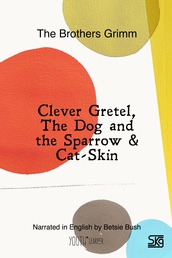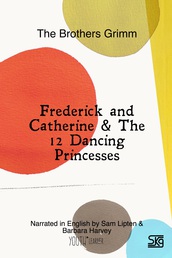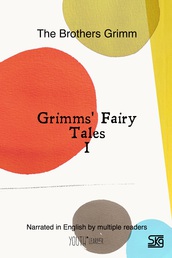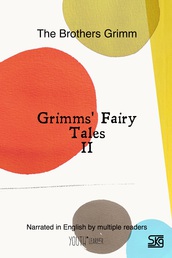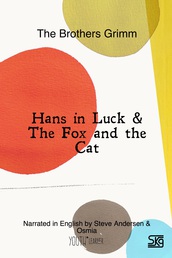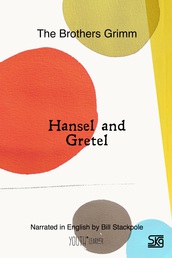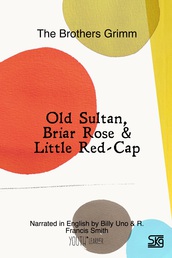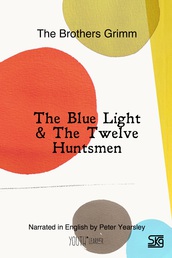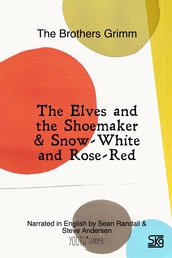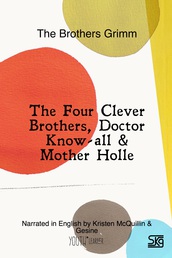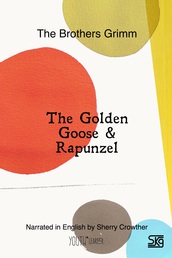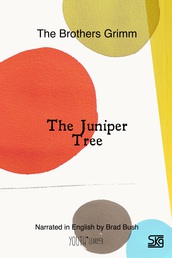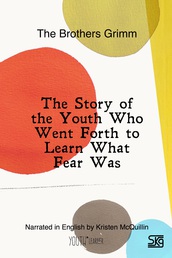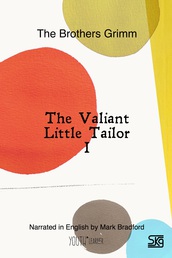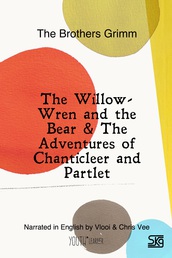The Little Peasant, Cat and Mouse & Fundevogel
by The Brothers Grimm
narrated by Scott Splavec
Language: English
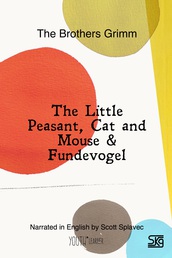
Number of pages: 32
Audiobook length: 0:20:29
EBook series:
Collection: Sinkronigo learner
Age Group: Youth literature
Read aloud type: Word-by-word
(Each word in the text is highlighted as it is spoken by the narrator)
Learn more about Sinkronigo read-aloud eBooks.
eBook description:
The Little Peasant is considered one of the great Grimm’s fairy tales, although if it is not one of the most famous. A poor farmer gets his hands on a calf, but can't afford to feed it, so he skins it and goes to the city to sell the hide. On his way, he catches a miller's wife dallying with a priest, but pretends that he can prophesy so that the miller, when he comes home, pays him a big sum to reveal where the wife's been stashing food to eat with her lover. The farmer goes home with all this money, saying he got it from selling his calf skin, and everyone in the village kills their cows, but none of them get nearly as much money. They plan to kill the farmer by drowning him, but he cleverly switches places with a shepherd, and when he appears again, with a flock of sheep, the whole town believes him when he says there are tons of sheep for the taking on the bottom of the lake. So the whole village drowns themselves, leaving the farmer wealthier than ever. Cat and Mouse in Partnership tells that a cat and a mouse, contrary to the custom of their kinds, become friends, such good friends that they decide to share a home. That they might have something to fall back on in time of need, they buy a pot of fat and hide it away in a nook of a church for safekeeping. After a short time, the cat tells her housemate that one of her relations has given birth and that the mouse's friend has been asked to be godmother. Instead of going to a christening, though, the cat goes to the nook of the church and eats the top layer of the fat in the pot. When the cat returns home, the mouse asks the name of the kitten. The cat replies, "Top-off." The mouse remarks that she has never heard such a name. Soon thereafter, the cat announces that she again has been invited to a christening. On the cat's return, the mouse asks what name was given to this kitten. "Half-gone," answers the cat. Again the mouse wonders aloud at the oddness of the name. The cat goes a third time to the church, this time finishing off the fat. When the cat returns, the mouse asks the name given at this christening. "All-gone," answers the cat. Again the mouse shakes her head. Winter arrives, and with it the lean times the friends had anticipated. The mouse proposes a trip to the church to retrieve the provisions stored there. When she beholds the empty pot, enlightenment dawns on the mouse: "First 'Top-off,' " she murmurs, "then 'Half-gone,' and then ..." The cat warns her to say no more, but the mouse persists. The cat pounces on the mouse and eats her up. "And that is the way of the world," the story closes. Fundevogel, or Foundling-Bird in English, is a German fairy tale collected by the Brothers Grimm. A hunter takes in a child he'd found in the woods, naming him Fundevogel (Foundling). Fundevogel grows up with the hunter's kid Lena, but when Lena overhears the old cook plotting to cook and eat Fundevogel, the two kids run away. The cook sends servants after then, but Foundling becomes a rosebush and Lena a rose on it, confusing the servants. This happens again with one becoming a church and the other becoming a chandelier in it. Finally, the cook goes after them herself, but Fundevogel becomes a pond and Lena a duck, and the cook drowns inside the pond. The kids go home safely and happily. The Brothers Grimm, Jacob (1785-1863) and Wilhelm (1786-1859), were born in the German state of Hesse. They were universally known for the collection of over two hundred folk tales they made from oral sources and published in two volumes of 'Nursery and Household Tales' in 1812 and 1814. Although their intention was to preserve such material as part of German cultural and literary history, and their collection was first published with scholarly notes and no illustration, the tales soon came into the possession of young readers. This was in part due to Edgar Taylor, who made the first English translation of part of the tales in 1823. (Summary from Wikipedia and Shmoop, adapted by Sinkronigo)
eBook index:
- The Little Peasant
- Cat and Mouse in Partnership
- Fundevogel



